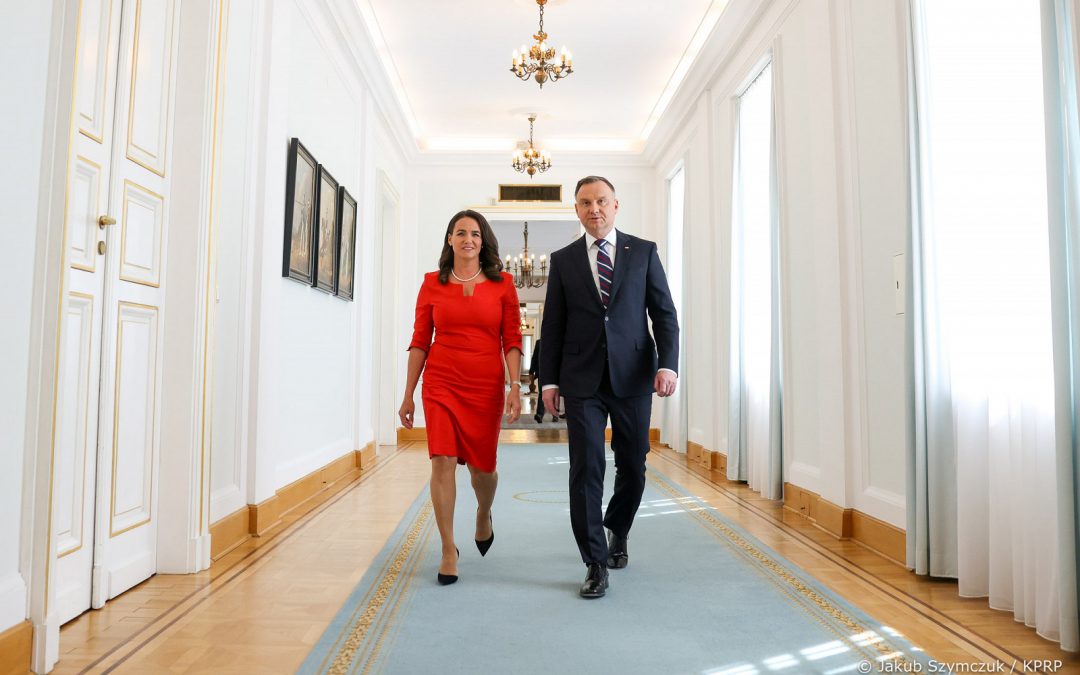Hungary’s new president, Katalin Novák, has visited her Polish counterpart Andrzej Duda on her first trip abroad since taking office last week. The two leaders struck a conciliatory tone following recent tensions between the allies over Russia’s invasion of Ukraine.
During the visit she appealed for Poland to help Hungary secure billions of euros in frozen EU funds, while Duda pushed for Budapest to support tougher sanctions on Russia.
Hungary's President Katalin Novak at her inauguration ceremony on Saturday condemned Russia's invasion of Ukraine and said her first trip would take her to Poland, in an apparent gesture to mend relations with Warsaw. https://t.co/c0HCkdDRTx
— Dr Marceli K. Król (@PfpEdu) May 14, 2022
Novák linked the two issues, noting that “resources are needed” if Hungary is to secure alternative energy sources. “We are therefore asking for the support of President [Duda] in order to obtain from the European Commission the recovery funds that have been earmarked for us,” she said.
Both Poland and Hungary have seen their share of Covid recovery funds frozen by the European Commission until they address rule of law concerns. However, in recent days the Polish government has claimed to have reached an agreement that will see its money unlocked.
By contrast, last month the commission launched its new “conditionality mechanism” for the first time against Hungary, allowing it to potentially cut further millions of EU funds for the country.
On Friday the Polish government claimed to have reached an agreement with the European Commission on the milestones that will result in the unfreezing of billions of euros in Covid recovery funds https://t.co/KggP5XNLyA
— Notes from Poland 🇵🇱 (@notesfrompoland) May 17, 2022
The Polish and Hungarian governments have in recent years been close political and ideological allies, especially in the EU arena, where they have regularly backed one another in clashes with Brussels over the rule of law, refugees and migrants, and culture war issues.
However, their very different responses to the war in Ukraine – with Hungary’s ruling Fidesz party keen to maintain good relations with Russia but Poland’s Law and Justice (PiS) taking a strongly anti-Russian line – has put the allies at odds with one another.
While after previous election victories Hungarian Prime Minister Viktor Orbán has made Poland the destination for his first foreign trip, last month he broke with that tradition after winning re-election, instead visiting the Vatican.
Speaking in Warsaw today, Novák, who previously served as a minister in Orbán’s government and as deputy leader of Fidesz, reiterated Hungary’s position that “we do not agree with solutions that require Hungarians to sacrifice more than they cause pain to the Russian aggressor”.
“When we have the right to say no to a decision and it is in the interest of Hungary [to do so], we say ‘no’,” she added. However, she also made clear that Hungary “condemns Putin’s aggression” against Ukraine, “stands by the innocent victims”, and “demands punishment of war crimes”.
Duda expressed understanding for Hungary’s position, noting that its “ties with Russia, including fundamental ties for the Hungarian economy, are very strong and very difficult to change quickly”. That task is made even harder when EU funds are being withheld, he added, quoted by TVN24.
Nevertheless, the Polish president expressed hope that it would be possible for the EU, including Hungary, to agree on a new sixth package of tougher sanctions against Russia.
Duda also criticised the lack of financial assistance from the EU for Poland, Hungary and other member states bordering Ukraine that have taken in large numbers of refugees.
“Poland and Hungary are not supported by the EU to implement refugee aid,” said Duda. “This policy undermines European unity. I assure our guests from Ukraine that we will do everything to ensure that they receive assistance and feel comfortable here.”
Prezydent @AndrzejDuda: Polska i Węgry nie otrzymują wsparcia od #UE, aby mogły realizować pomoc dla uchodźców. Taka polityka podważa jedność europejską. Zapewniam naszych gości z Ukrainy, że będziemy robić wszystko, aby otrzymywali pomoc i dobrze się tu czuli.
— Kancelaria Prezydenta (@prezydentpl) May 17, 2022
Main image credit: Jakub Szymczuk/KPRP

Alicja Ptak is deputy editor-in-chief of Notes from Poland and a multimedia journalist. She has written for Clean Energy Wire and The Times, and she hosts her own podcast, The Warsaw Wire, on Poland’s economy and energy sector. She previously worked for Reuters.




















